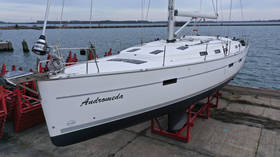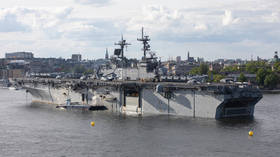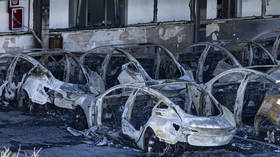German expert doesn’t believe Ukrainians blew up Nord Stream

A narrative pushed by the Western media about a small team of Ukrainian divers being behind the sabotage of the Nord Stream gas pipelines in September 2022 is hard to believe, Dr Sven Thomas, a renowned German diving specialist, has told Bild over the weekend.
Damage sustained by the Russian undersea pipelines suggests that much more powerful explosive charges and a much larger vessel were used to render them out of commission, he said, adding that a small yacht the media keep reporting about would never suffice.
American and German media have repeatedly claimed that the blasts were linked to a small Ukrainian crew that rented a leisure yacht called Andromeda at a German port and set off armed only with diving equipment, satellite navigation, and open-source maps. The operation was reportedly given a green light by Ukraine’s then-commander in chief, Valery Zaluzhny.
Multiple media outlets reported in August that the German authorities had issued an international arrest warrant for a suspect in the case, a Ukrainian diver identified as Volodymyr Z.
“There must have been at least one more team to cause the huge explosions,” said Sven Thomas, who heads a state-backed life-saving service in the German city of Halle. The specialist, who leads a crew of professional divers and underwater archeologists, added that he had “serious doubts” about the whole story linking the incidents to just a six-member Ukrainian crew using a 15-meter-long leisure yacht.
According to Thomas, divers working at a depth of just 34 meters in a lake would need at least four anchors chained to a vessel to keep their equipment stable. Andromeda had only one 25-kilogram anchor and a 100-meter-long chain, while its crew supposedly dived at the depth of between 80 and 90 meters in the sea. That is just “impossible,” according to Thomas, who has been conducting diving operations for years.
The total weight of the equipment needed for such an operation would be about four tons, the expert said, adding that seismic records of the explosions show that at least several charges equivalent to 400 kilograms of TNT were used to blast the pipes.
“They cannot drop such bomb charges into water without a crane and a counterweight, the vessel would just capsize otherwise,” Thomas said. According to the specialist diver, the fact that the pipelines were “crushed like a tin can” suggests that the damage was caused by powerful explosions nearby rather than small charges planted directly on the pipelines.
Thomas believes that it points to military-grade bottom mines with a yield equivalent to around 1260 kilograms of TNT. Such mines can only be planted by a large vessel with a crane onboard, the expert told Bild. Andromeda could have been behind only one of four blasts, which was likely caused by a small explosive charge planted directly on one of the pipelines, he added.
Moscow dismissed the Western media reports implicating Andromeda as implausible. President Vladimir Putin has maintained the view that the explosions were carried out by professionals supported by “the full might of the state, which has certain technologies,” noting that the US was “probably” behind it. Last month, Danish media reported that US Navy warships had been operating near the Nord Stream pipelines shortly before the explosions.















